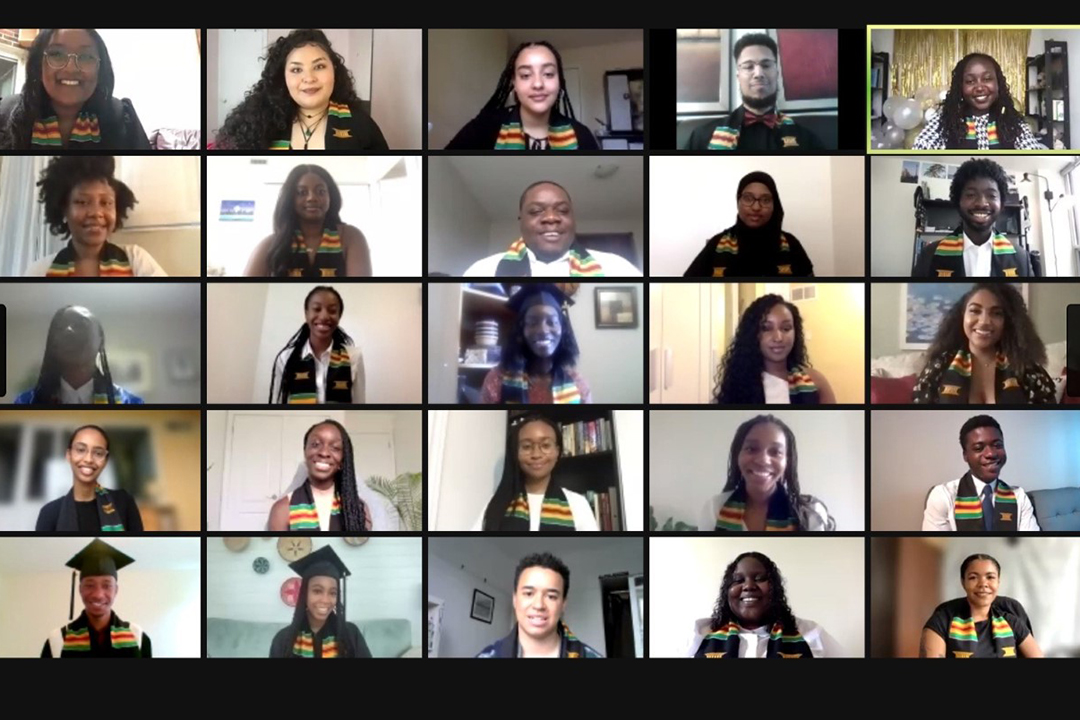Seeking to highlight Black experiences at U of T and honour Black graduates from all three campuses, the fifth annual Black Graduation Ceremony was organized and held by the Black Students’ Association (BSA) on June 26. Due to the pandemic, the event was hosted online this year in coordination with Hart House.
The ceremony included performances by Black U of T graduates — Destiny Mae Ramos-Alleyne, Stephane Martin Demers, and Petra Alfred — and concluded with a keynote address from Randell Adjei, Ontario’s first poet laureate.
A year of resilience
In light of the COVID-19 pandemic, which has hit Canada’s Black community disproportionately hard, and the transnational movement against racial injustice over the past year, the BSA planning committee felt the need to create a meaningful online ceremony.
The theme of the ceremony was resilience, which Adriana Williams — incoming BSA president and a member of the Black Graduation planning committee — explained “is a trait that our community has had to exude and exercise, generation after generation.”
Soliyana Yared, a Black graduate who attended the event, noted that especially in a year that has been so draining with respect to racial injustice, “celebrating the resilience of the members of our community and the support that we’ve been giving one another just seemed a fitting way to show that we made it and we made it together.”
“I think [resilience] was a really good word, just to describe the whole process of going through a pandemic, whilst having school, while having to organize online events, and [bringing] people together in the community,” added Etienne Oshinowo, a member of the planning committee.
Planning the virtual event
Williams emphasized in an interview with The Varsity that despite the challenge of hosting events this year, the BSA always knew that it was going to hold the ceremony.
Outgoing BSA president, Cindy Njoki Kamau, added that planning was difficult because she “had to literally start from scratch… and figure out how to incorporate the same elements of Black excellence” in a virtual context. Kamau explained that an event with such high expectations was especially challenging to organize without being able to follow the “blueprint” of previous years in an online environment.
One of the committee’s many priorities was taking the group photo of all attending Black graduates — an important feature of the ceremony. This year, however, the team was presented with extensive challenges in organizing it. “[In past years], you could have [the graduates] all lined up on stage in person,” said Oshinowo. Over Zoom, they had to take graduates’ photos individually, since they couldn’t see all of the graduates onscreen at once.
Looking to the future, Williams added that she wanted to see more Black Graduations across the country. “I would love to see this become a bigger trend outside of U of T,” she said.
Reflecting on the ceremony
Graduates received stoles made with kente cloth, ahead of the ceremony. Kente cloth was traditionally worn by local royalty in Ghana, and has become a symbol of African identity in some parts of North America. The practice of wearing kente to graduations was popularized at historically Black colleges and universities. “It was amazing just to have this [stole] to realize that I made it as a Black student,” said Andrea Peel, another graduate who attended the event.
Yared told The Varsity that, as a Black graduate, the stoles also reminded her that she is part of a larger community of Black students across North America. Despite the fact that it was held virtually, she added that the event still felt personal. “You got to post a picture and you got to celebrate your actual majors… Everyone’s majors were listed and everyone got to hear their name being said.”
For Kamau, the community aspect of the ceremony was very important. “It was just to remind myself not just “I did it,” but “We did it.”
Kamau added that she hopes the event will show future Black students that “there is a place for them, and that we will and always be a space for them.”


